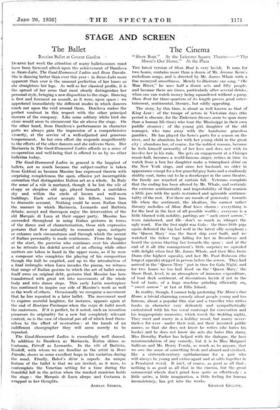Russian Ballet at Covent Gard= •
STAGE AND SCREEN
The Ballet
DURING last week the attention of many balletomanes must have been focussed afresh upon the achievement of Danilova in Swan-Lake, The Good-Humoured Ladies and Beau Danube. She is dancing better than ever this year : in Swan-Lake more apparent than ever is the unusual perfection of her knees as she straightens her legs. As well as her classical profile, it is the spread of her arms that most clearly distinguishes her personal style, bringing a new disposition to the stage. Dancing is first and foremost an assault, as it were, upon space : we apprehend immediately the different modes in which dancers reach out upon the void around them. Danilova makes the perfect contrast in this respect with the other principal dancers of the company. Like some solitary white bird she alode would seem to circumvent the air above the stage. On the other hand, from Danilova's performances in character parts we always gain the impression of a comprehensive vivacity, at the service of a well-adjusted and generous temperament. In her own effort she responds magnificently to the efforts of the other dancers and she enlivens them. Her Mariuecia in The Good-Humoured Ladies affords us a sense of co-operation and well-being that is offered to us by no other ballerina today.
The Good-Humoured Ladies in general is the happiest of ballets, not so much because the subject-matter is taken from Goldoni as because Massine has expressed therein with surprising completeness the open, effusive yet incorruptible animation that distinguishes Italian art as a whole. In Italy the sense of a role is nurtured, though it be but the role of sbepy or sleepless old age, played beneath a matchless sky and within the circle of brown and well-worn buildings. Each actor accepts his fellow, turns him to dramatic account. Nothing could be more Italian than the manner in which Mariuccia, Leonardo and Battista debate, accept and thereupon enjoy the intervention of the old Marquis di Luca at their supper party. Mas.sine has succeeded throughout in using Italian gestures in terms of the dance and of characterisation, those rich expressive gestures that flow naturally to comment upon, mitigate or enhance each circumstance and through which the accent of Italian personality is made continuous. From the beggar at the start, the poverino who continues over his shoulder as he retreats his doleful accord of an offering while other matters are taken in hand in the upper room, as if he were a composer who completes the playing of his composition though the hall be emptied, and up to the introduction of a final imbroglio when Luca invades the piazza, we witness that range of Italian gesture to which the art of ballet mime itself owes an original debt, gestures that Massine has here transformed with great wit into movements of the whole body and into dance steps. This early Latin masterpiece has continued to inspire one side of Massine's work as well as the work of others. Occasionally we recognise a movement that he has repeated in a later ballet. The movement used to express scornful laughter, for instance, appears again at the end of Boutique Fantasque when the corps de ballet mock the customers. If it is perfect, be it noted, such an invention preserves its originality for a new but completely relevant context, as is the case of classical pas all of which lend them- selves to the effect of re-creation : at the hands of an indifferent choregrapher they will seem merely to be repeated.
The- Good-Humoured Ladies is exceedingly well danced. In addition to Danilova as Mariuccia, Zorina shines as Costanza, Petroff as Leonardo. In the role of Battista, Kosloff, with whom we are familiar as .the artist in Beau Danube, shows us some excellent leaps in his variation during the meal. Finally, Bakst's decor is superb. An unique feature of the ballet is that we are invited, as it were, to contemplate the Venetian setting for a time during the beautiful lull in the action when the masked musician holds the stage : the Marquis di Luca sleeps and Costanza is wrapped in her thoughts.
ADRIAN STOKES.










































 Previous page
Previous page